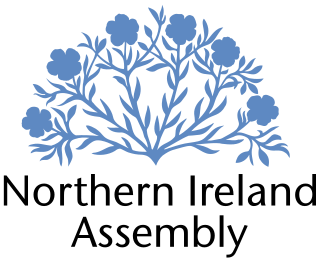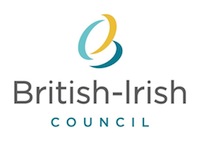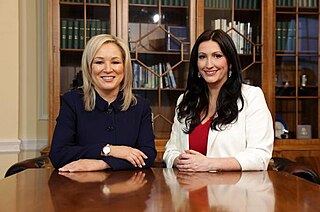
Seamus Frederick Mallon was an Irish politician who served as deputy First Minister of Northern Ireland from 1998 to 2001 and Deputy Leader of the Social Democratic and Labour Party (SDLP) from 1979 to 2001. He also sat in the House of Commons of the United Kingdom from 1986 to 2005.

Joseph Austin Currie was an Irish politician who served as a Minister of State with responsibility for Children's Rights from 1994 to 1997. He served as a Teachta Dála (TD) for the Dublin West constituency from 1989 to 2002, representing Fine Gael, and as a Member of the Parliament of Northern Ireland (MP) for East Tyrone from 1964 to 1972, representing the Nationalist Party and later the Social Democratic and Labour Party (SDLP).

The Northern Ireland Assembly, often referred to by the metonym Stormont, is the devolved legislature of Northern Ireland. It has power to legislate in a wide range of areas that are not explicitly reserved to the Parliament of the United Kingdom, and to appoint the Northern Ireland Executive. It sits at Parliament Buildings at Stormont in Belfast.

The British–Irish Council is an intergovernmental organisation that aims to improve collaboration between its members in a number of areas including transport, the environment and energy. Its membership comprises Ireland, the United Kingdom, the devolved governments of Northern Ireland, Scotland and Wales, in addition to the governments of the British Crown Dependencies: Guernsey, Jersey and the Isle of Man. As England does not have a devolved administration, it is not individually represented on the council but only as a member of the United Kingdom.
The Northern Ireland Executive is the devolved government of Northern Ireland, an administrative branch of the legislature – the Northern Ireland Assembly, situated in Belfast. It is answerable to the assembly and was initially established according to the terms of the Northern Ireland Act 1998, which followed the Good Friday Agreement. The executive is referred to in the legislation as the Executive Committee of the assembly and is an example of consociationalist ("power-sharing") government.
Robert Law McCartney, KC is a Northern Irish barrister and Unionist politician who was leader of the UK Unionist Party (UKUP) from 1995 to 2008.

Parliament Buildings, often referred to as Stormont, because of its location in the Stormont Estate area of Belfast, is the seat of the Northern Ireland Assembly, the devolved legislature for the region. The purpose-built building, designed by Arnold Thornely, and constructed by Stewart & Partners, was opened by Edward, Prince of Wales, in 1932.
The North/South Ministerial Council (NSMC) is a body established under the Good Friday Agreement to co-ordinate activity and exercise certain governmental powers across the whole island of Ireland.

John Thomas Alderdice, Baron Alderdice is a Northern Ireland politician. He was the Speaker and a Member of the Northern Ireland Assembly (MLA) for East Belfast from 1998 to 2004 and 1998 to 2003, respectively. Alderdice was the leader of the Alliance Party of Northern Ireland from 1987 to 1998, and since 1996 has sat in the House of Lords as a Liberal Democrat.
The following outline is provided as an overview of and topical guide to the Troubles.

Since at least 1542, England and later Great Britain and Ireland have been connected politically, reaching a height in 1801 with the creation of the United Kingdom of Great Britain and Ireland. About five-sixths of the island of Ireland seceded from the United Kingdom in 1922 as the Irish Free State. Historically, relations between the two states have been influenced heavily by issues arising from their shared history, the independence of the Irish Free State and the governance of Northern Ireland. These include the partition of Ireland and the terms of Ireland's secession, its constitutional relationship with and obligations to the UK after independence, and the outbreak of political violence in Northern Ireland. Additionally, the high level of trade between the two states, their proximate geographic location, their common status as islands in the European Union until Britain's departure, common language and close cultural and personal links mean political developments in both states often closely follow each other.
The New Ireland Forum was a forum in 1983–1984 at which Irish nationalist political parties discussed potential political developments that might alleviate the Troubles in Northern Ireland. The Forum was established by Garret FitzGerald, then Taoiseach, under the influence of John Hume, for "consultations on the manner in which lasting peace and stability can be achieved in a new Ireland through the democratic process". The Forum was initially dismissed, by Unionists, Sinn Féin, and others, as a nationalist talking-shop. The Forum's report, published on 2 May 1984, listed three possible alternative structures: a unitary state, a federal/confederal state, and joint British/Irish authority. The British Prime Minister, Margaret Thatcher, dismissed the three alternatives one by one at a press conference, each time saying, "that is out", in a response that became known as the "out, out, out" speech. However, Garret Fitzgerald, who described the Forum's report as "an agenda not a blueprint", valued it as establishing a nationalist consensus from which the 1985 Anglo-Irish Agreement could be framed.

The British–Irish Parliamentary Assembly is a deliberative body consisting of members elected to those national legislative bodies found within Ireland and the United Kingdom, namely the parliaments of the United Kingdom, Ireland, Scotland, Wales, Northern Ireland and the British crown dependencies. Its purpose is to foster common understanding between elected representatives from these jurisdictions.

The 2007 Northern Ireland Assembly election was held on Wednesday, 7 March 2007. It was the third election to take place since the devolved assembly was established in 1998. The election saw endorsement of the St Andrews Agreement and the two largest parties, the Democratic Unionist Party (DUP) and Sinn Féin, along with the Alliance Party, increase their support, with falls in support for the Ulster Unionist Party (UUP) and the Social Democratic and Labour Party (SDLP).

The First Minister and deputy First Minister of Northern Ireland are the joint heads of government of Northern Ireland, leading the Northern Ireland Executive and with overall responsibility for the running of the Executive Office. Despite the titles of the two offices, the two positions have the same governmental power, resulting in a duumvirate; the deputy First Minister, customarily spelled with a lowercase d, is not subordinate to the First Minister. Created under the terms of the 1998 Good Friday Agreement, both were initially nominated and appointed by members of the Northern Ireland Assembly on a joint ticket by a cross-community vote, under consociational principles. That process was changed following the 2006 St Andrews Agreement, such that the First Minister now is nominated by the largest party overall, and the deputy First Minister is nominated by the largest party from the next largest community block.
The British–Irish Intergovernmental Conference (BIIGC) is an intergovernmental organisation established by the Governments of Ireland and the United Kingdom under the Good Friday Agreement in 1998. It first met in London in 1999, and the latest meeting took place at 100 Parliament Street in London on 29 April 2024.

The Good Friday Agreement (GFA) or Belfast Agreement is a pair of agreements signed on 10 April 1998 that ended most of the violence of the Troubles, an ethno-nationalist conflict in Northern Ireland since the late 1960s. It was a major development in the Northern Ireland peace process of the 1990s. It is made up of the Multi-Party Agreement between most of Northern Ireland's political parties, and the British–Irish Agreement between the British and Irish governments. Northern Ireland's present devolved system of government is based on the agreement.
The North/South Consultative Forum is a planned civic forum on the island of Ireland envisioned as part of the Good Friday Agreement. The Forum is envisioned as an independent consultative forum appointed by the Government of Ireland and the Northern Ireland Executive "comprising the social partners and other members with expertise in social, cultural, economic and other issues" and being representative of civil society.

In the United Kingdom, intergovernmental relations are the coordination and engagement between the central UK Government and the devolved Scottish Government, Welsh Government and Northern Ireland Executive. The Prime Minister and Heads of Devolved Governments Council is where the heads of these administrations meet.

The East–West Council was established in 2024 as part of the Northern Ireland Executive reformation with a purpose to improve links between Northern Ireland and rest of the United Kingdom.












